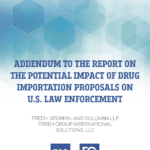Law Enforcement
Former FBI Director Louis Freeh Updates His 2017 Report on the Threat of Congressional Drug Importation Proposals
Former FBI Director Louis Freeh has released an addendum to his 2017 Report on the Potential Impact of Drug Importation Proposals on U.S. Law Enforcement, concluding:
…the government has not done enough to evaluate and improve the capacity of law enforcement to deal with a new pipeline of drugs into the U.S. drug supply, all while . . . more illegal drugs are being shipped to the United States. Passing any drug importation scheme would erase the little progress we have made and set law enforcement further back on their heels.
[...]Former FBI Director Discusses the Dangers of Allowing Drug Importation in Radio Interview
Freeh warned that allowing drug importation from Canada was akin to allowing drugs to be imported from anywhere. Quality would be at risk, and the opioid crisis, an epidemic that killed over 33,000 Americans in 2015, would only get worse. He said that allowing drug importation, “…will not only fuel that, but it will also, in my opinion, encourage a lot of criminal groups and organizations that heretofore have not been involved in this trade, but will see huge opportunities to enter the market.”
[...]“Operation Pangea VI: combating sale of unapproved medicines.” WHO Drug Information 27, no. 3 (September 2013): 227.
Abstract: The article reports on a 2013 decision which the U.S. Food and Drug Administration and several other international law enforcement and regulatory agencies made to take legal and regulatory action against more than 9,600 web sites from various countries that illegally market unproven prescription drugs to consumers. "Operation Pangea VI: combating sale of unapproved…
[...]Ganor, Boaz, and Miri Halperin Wernli. “The Infiltration of Terrorist Organizations Into the Pharmaceutical Industry: Hezbollah as a Case Study.” Studies In Conflict & Terrorism 36, no. 9 (September 2013): 699-712.
Abstract: Criminal syndicates and terrorist organizations are inherently different, one motivated by profit and the other by political goals. Yet their difference enables them to cooperate for their mutual benefit. Nowhere has this been more evident than in the drug trade; from harvesting and trafficking in illegal substances, it has been an easy transition to counterfeiting…
[...]Mackey TK, Liang BA*. The Global Counterfeit Drug Trade: Patient Safety and Public Health Risks. J Pharm Sci. 2011 Nov;100(11):4571-9.
Abstract Counterfeit drugs are a global problem with significant and well-documented consequences for global health and patient safety, including drug resistance and patient deaths. This multibillion-dollar industry does not respect geopolitical borders, and threatens public health in both rich and resource-poor nations alike. The epidemiology of counterfeits is also wide in breadth and scope, including…
[...]Liang B A*, Mackey T. Direct-to-Consumer Advertising With Interactive Internet Media. JAMA. 2011 2 23; 305 (8): 824-825.
Direct-to-consumer advertising (DTCA) is legal only in the United States and New Zealand and has been linked with drug overutilization, public health concerns, and higher costs. 1 Despite global proscriptions, DTCA is the most rapidly increasing form of pharmaceutical marketing, with approximately $4 billion in US expenditures, outpacing physician marketing and research and development. Liang…
[...]Kubic TT.* Law Enforcement and Industry: Key Partners for Safe Medicines. J Biolaw Bus. 2010;13(1&2):38-41.
Counterfeit and diverted medicines are a key public health concern. Developing as well as developed countries are experiencing increases in patient safety risks due to these illicit drug forms. Public-private coordination between industry stakeholders and law enforcement can address the developments and trends in the counterfeit and diverted drug arena. In this piece, one such…
[...]Giacolone RP. Drug Wholesaling and Importation: Challenges and Opportunities. California Western Intl Law J. 2005;36:65-76.
Much interest and controversy abounds regarding the benefits and perils associated with the importation of pharmaceuticals. The Internet has provided an uncertain vehicle for such importation especially as it pertains to two key areas: product authentication and product integrity. As a result, questions exist as to whether other U.S. entities may provide a more legitimate…
[...]Liang BA.* Over The Virtual and Geographic Borders: Understanding Importation and Counterfeit Drugs. Cal W Int Law J. 2005 Jun 3;36(1):7-18
Abstract. U.S. citizens depend extensively on medicines for health and quality of life. Yet a major problem attends the drug supply: counterfeit medicines. Although currently the United States has a relatively safe, closed system, it has not been immune to counterfeits, and harm associated with counterfeits has occurred here. Further, because terrorist activities have been…
[...]
